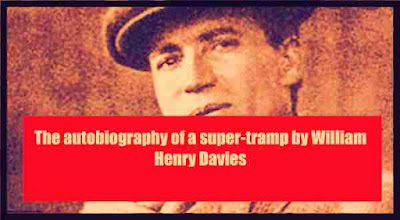Download The autobiography of a super tramp - PDF by William Henry Davies
The autobiography of a super-tramp
 |
| The autobiography of a super tramp |
From preface:
I hope these expressions will not excite unreasonable expectations of a thrilling realistic romance, or a scandalous chronicle, to follow. Mr. Davies' auto-biography is not a bit sensational: it might be the Post Office Directory for the matter of that
A less simple-minded Supertramp would not have thought it worth writing at all; for it mentions nothing that might not have happened to any of us. As to scandal, I, though a most respectable author, have never written half so proper a book. These prudent pages are unstained with the frightful language, the de- based dialect, of the fictitious proletarians of Mr. Rudyard Kipling and other genteel writers. In them, the patrons of the casual ward and the dosshouse argue with the decorum of Socrates and narrate in the style of Tacitus.
They have that pleasant combination of childish freshness with scrupulous literary conscientiousness only possible to people for whom speech, spoken or written, but especially written, is still a feat to be admired and shown off for its own sake. Not for the life of me could I capture that boyish charm and combine it with the saviour vivre of an experienced man of the world, much less of an experienced tramp.
The innocence of the author's manner and the perfection of his delicacy is such, that you might read his book aloud in an almshouse without shocking the squeamishness of old age. As for the young, nothing shocks the young. The immorality of the matter is stupendous, but it is purely industrial immorality. As to the sort of immorality that is most dreaded by schoolmistresses and duennas, there is not a word in the book to suggest that tramps know even what it means.
On the contrary, I can quite believe that the author would die of shame if he were asked to write such books as Adam Bede or David Copper- field. The manuscript came into my hands under the following circumstances. In the year 1905, I received by post a volume of poems by one William H. Davies, whose address was The Farm House, Kennington S. E. I was surprised to learn that there was still a farmhouse left in Kennington; for [viii] Preface I did not then suspect that the Farmhouse, like the Shepherdess Walks and Nightingale Lanes and Whetstone Parks of Bethnal Green and Holborn, is so-called nowadays in irony, and is, in fact, a doss- house, or hostelry where single men can have a night's lodging for, at most, sixpence.
I was not surprised at getting the poems. I get a gift of minor poetry once a week or so; and yet, hardened as I am to it, I still, knowing how much these little books mean to their authors, can seldom throw them aside without a twinge of compunction which I allay by a glance at one of the pages in the faint but inextinguishable hope of finding something valuable there.
Sometimes a letter accompanies the book; and then I get a rapid impression, from the handwriting and notepaper as well as from the binding and type in the book, or even from the reputation of the publisher, of the class and type of the author. Thus I guess Cambridge or Oxford or Maida Vale or West Kensington or Exeter or the lakes or the east coast; or a Newdigate prizeman, a romantic Jew, a maiden lady, a shy country parson or whom not, what not, were not. When Mr Davies' book came to hand my imagination failed me. I could not place him.
There were no author's compliments, no publisher's compliments, indeed no publisher in the ordinary channel of the trade-in minor poetry. The author, as far as I could guess, had walked into a printer's or stationer's shop; handed in his manuscript; and ordered his book as he might have ordered a pair of boots. It was marked "price half a crown." An accompanying letter asked me very civilly if I required a half-crown book of verses; and if so, would I please send the author the half-crown: if not, would I return the book.
This was attractively simple and sensible. Further, the handwriting was remarkably delicate and individual: the sort of handwriting one might expect from Shelley or George Meredith. I opened the book and was more puzzled than ever; for before I had read three lines I perceived that the author was a real poet. His work was not in the least strenuous or modern: there was in it no sign that he had ever read anything later than Cowper or Crabbe, not even Byron, Shelley or Keats, much less Morris, Swinburne, Tennyson, or Henley and Kipling. There was indeed no sign of his ever having read anything otherwise than as a child reads.
The result was freedom from literary vulgarity which was like a draught of clear water in a desert. Here, I saw, was a genuine innocent, writing odds and ends of verse about odds and ends of things, living quite out of the world in which such things are usually done, and knowing no better (or rather no worse) than to get his book made by the appropriate craftsman and hawk it round like any other ware.
Author: William Henry Davies
Publication Date:1917
Author: William Henry Davies
Publication Date:1917
Publisher New York: A.A. Knopf
Download
Download









